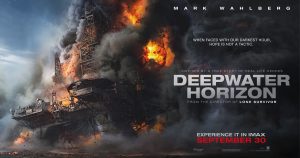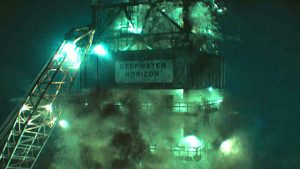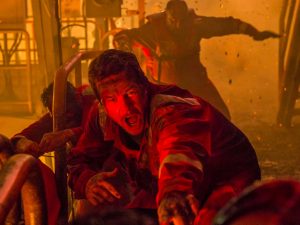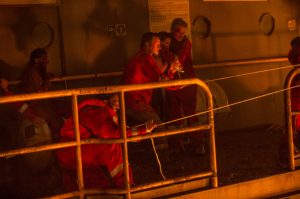
As a disaster flick, “Deepwater Horizon” is solid. It builds slowly to the catastrophe, developing dread from both the impending doom and engaging character development. Thanks to this, the catastrophe feels intense and raw when it finally strikes, as opposed to just being a spectacle. Yes, the effects are tremendous, but they’re meant to elicit suspense more so than awe. That’s more than I can say for the general disaster flick, so this one may just be amidst the cream of the crop. The film even utilizes shaky camerawork and close quarters shots to its advantage, purposely masking the action as to make the viewer feel as if they’re part of it. I’ve complained about that in the past (wanting to see the action, not be part of it), but the circumstances are different here. This is a drama, not an action film, so being put into the action makes sense to ratchet up the tension. Had I just seen the action, I wouldn’t have felt the impact as much.
As a dramatic recreation of the events of the BP oil spill, “Deepwater Horizon” is rather lukewarm. Its heart is in the right place, focusing on the human side of the disaster. Its problem is that it fully adheres to the tropes of a disaster flick, turning a good lot of the characters into stereotypes. Some of them upend this by being engaging characters, mainly the blue collar heroes. Others, such as the villains in BP business attire, succumb to cartoonish behavior. The script (credited to Matthew Sand & Matthew Michael Carnahan) paints everything in broad strokes like one would for a B-movie disaster flick, playing up the heroics and evilness. Seeing as how this film is realistic, these stereotypes feel out of place and dilute some of the drama.

I credit Peter Berg for protecting the film from nose-diving into full-on B-movie territory. While he never fully irons out the stereotypes, he keeps them grounded for the most part, especially when the oil spill occurs. The heroes, in this case Mike Williams (Mark Wahlberg) & Jimmy Harrell (Kurt Russell), are relatable and appealing average joes trying to do their jobs. The former is a loving husband to Felicia (Kate Hudson) and a caring father to Sydney (Stella Allen); the latter is a man of the people, more worried about his crew than profit. Yes, they’re both stereotypes, but believable ones. When the time calls for them to save the day, it’s easy to accept their roles and cheer them on.
It’s the stereotype of the villains that hurts the film, in particular Vidrine (John Malkovich). He’s the head honcho responsible for the oil spill, neglecting the warnings of the crew that the tests weren’t safe and the pipes would blow. I don’t deny the heinousness of this action, but I object to the way it plays out. Vidrine is portrayed as a cartoon villain, prancing around hurling insults and barking out orders. He chews the scenery to the point that there is none left. All that’s missing is a giant mustache for him to twirl. He’s more akin to a villain one would find in a mindless actioner, not a pragmatic drama. The villain in Antoine Fuqua’s “The Magnificent Seven” was more believable!

I find it interesting that Berg and the Matthews decided to play up the theatrics in order to create an antagonist seeing as how the real-life story gave them suitable ones. I think back to “Sully” in which Clint Eastwood portrayed the NTSB as vultures looking to throw the heroic pilot under the bus for no other reason than to cause manufactured conflict. Here, the conflict didn’t need to be manufactured, so why did it feel as if it was? Why couldn’t Vidrine and his cohorts be shown as real humans with a terrible agenda? Why must they be reduced to over-the-top villains who must pound their intentions into the audience’s heads? Because they belong in a B-movie disaster flick, one this film is modeled after. Berg and the Matthews should’ve kept the template but did away with the character archetypes.
Thankfully, Vidrine and his snooty henchman are kept to the wayside during the oil spill, with the focus rightfully being on the rescue mission. This is where the film is at its best, a pressure cooker of the highest order! The tension is palpable as Williams & Harrell traverse through the flaming oil rig in search for compadres and escape. There’s many a wince-inducing moment, such as Harrell digging glass out of his feet, a fallen worker’s bone being stuck in the rubble, and a death-defying leap into the ocean as rubble rains down. It’s what edge-of-your-seat thrillers are made of, made more effective due to the raw emotion on display.

Maybe copying the formula of a disaster flick wasn’t the brightest of ideas in the long run. It causes the screenplay to be guided by the tropes, such as cheesy premonitions (birds hitting the helicopter on the flight over, a businessman wearing a magenta tie that mirrors the highest of alerts) and buffoonish dialogue. Once Berg and the Matthews get the tropes out of their system, they treat the subject matter with respect and dignity, showing the horrors of the catastrophe and the humanity of the crew. A brief glimpse into the aftermath doesn’t hold back from its effects on the victims’ mental state.
To go into “Deepwater Horizon” expecting a thorough breakdown of the BP oil spill would be a foolish endeavor. To go into it expecting a harrowing recreation of the incident itself would be a smarter choice. Only then can you appreciate the film for what it is: an effective human drama encased in a cogent disaster flick.
Final Rating: B
